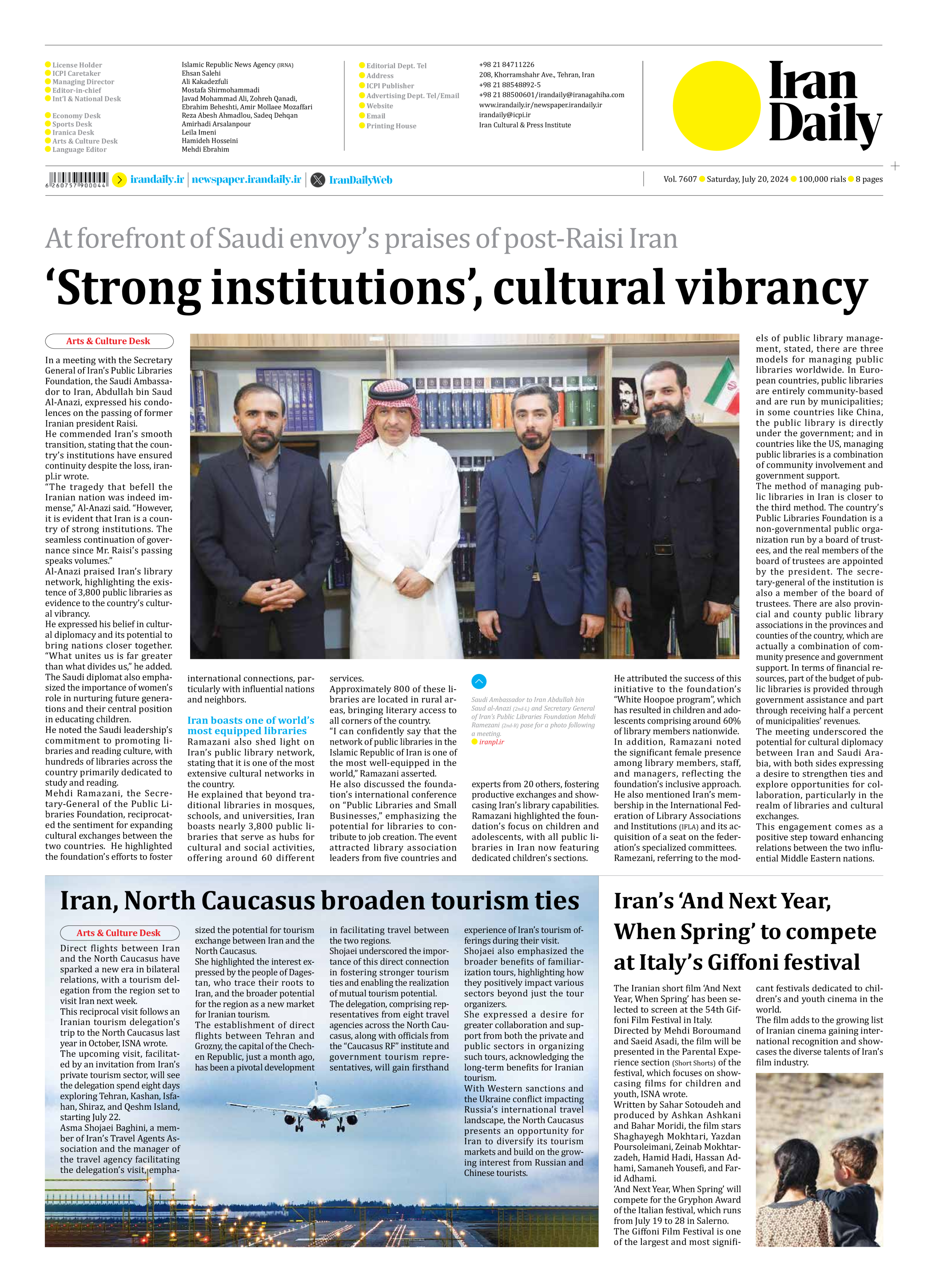
At forefront of Saudi envoy’s praises of post-Raisi Iran
‘Strong institutions’, cultural vibrancy
In a meeting with the Secretary General of Iran’s Public Libraries Foundation, the Saudi Ambassador to Iran, Abdullah bin Saud Al-Anazi, expressed his condolences on the passing of former Iranian president Raisi.
He commended Iran’s smooth transition, stating that the country’s institutions have ensured continuity despite the loss, iranpl.ir wrote.
“The tragedy that befell the Iranian nation was indeed immense,” Al-Anazi said. “However, it is evident that Iran is a country of strong institutions. The seamless continuation of governance since Mr. Raisi’s passing speaks volumes.”
Al-Anazi praised Iran’s library network, highlighting the existence of 3,800 public libraries as evidence to the country’s cultural vibrancy.
He expressed his belief in cultural diplomacy and its potential to bring nations closer together. “What unites us is far greater than what divides us,” he added.
The Saudi diplomat also emphasized the importance of women’s role in nurturing future generations and their central position in educating children.
He noted the Saudi leadership’s commitment to promoting libraries and reading culture, with hundreds of libraries across the country primarily dedicated to study and reading.
Mehdi Ramazani, the Secretary-General of the Public Libraries Foundation, reciprocated the sentiment for expanding cultural exchanges between the two countries. He highlighted the foundation’s efforts to foster international connections, particularly with influential nations and neighbors.
Iran boasts one of world’s most equipped libraries
Ramazani also shed light on Iran’s public library network, stating that it is one of the most extensive cultural networks in the country.
He explained that beyond traditional libraries in mosques, schools, and universities, Iran boasts nearly 3,800 public libraries that serve as hubs for cultural and social activities, offering around 60 different services.
Approximately 800 of these libraries are located in rural areas, bringing literary access to all corners of the country.
“I can confidently say that the network of public libraries in the Islamic Republic of Iran is one of the most well-equipped in the world,” Ramazani asserted.
He also discussed the foundation’s international conference on “Public Libraries and Small Businesses,” emphasizing the potential for libraries to contribute to job creation. The event attracted library association leaders from five countries and experts from 20 others, fostering productive exchanges and showcasing Iran’s library capabilities.
Ramazani highlighted the foundation’s focus on children and adolescents, with all public libraries in Iran now featuring dedicated children’s sections.
He attributed the success of this initiative to the foundation’s “White Hoopoe program”, which has resulted in children and adolescents comprising around 60% of library members nationwide.
In addition, Ramazani noted the significant female presence among library members, staff, and managers, reflecting the foundation’s inclusive approach.
He also mentioned Iran’s membership in the International Federation of Library Associations and Institutions (IFLA) and its acquisition of a seat on the federation’s specialized committees.
Ramezani, referring to the models of public library management, stated, there are three models for managing public libraries worldwide. In European countries, public libraries are entirely community-based and are run by municipalities; in some countries like China, the public library is directly under the government; and in countries like the US, managing public libraries is a combination of community involvement and government support.
The method of managing public libraries in Iran is closer to the third method. The country’s Public Libraries Foundation is a non-governmental public organization run by a board of trustees, and the real members of the board of trustees are appointed by the president. The secretary-general of the institution is also a member of the board of trustees. There are also provincial and county public library associations in the provinces and counties of the country, which are actually a combination of community presence and government support. In terms of financial resources, part of the budget of public libraries is provided through government assistance and part through receiving half a percent of municipalities’ revenues.
The meeting underscored the potential for cultural diplomacy between Iran and Saudi Arabia, with both sides expressing a desire to strengthen ties and explore opportunities for collaboration, particularly in the realm of libraries and cultural exchanges.
This engagement comes as a positive step toward enhancing relations between the two influential Middle Eastern nations.







